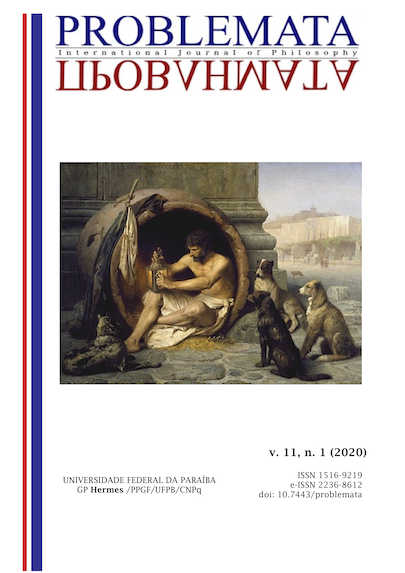THE PROBLEM OF TIME FROM TWO PERSPECTIVES:
THE OUTLINES OF EDMUND HUSSERL’S PHENOMENOLOGY AND FRANCISCO VARELA’S NEUROPHENOMENOLOGY
DOI:
https://doi.org/10.7443/problemata.v11i1.49088Keywords:
Time, Phenomenology, Neurophenomenology, Husserl, VarelaAbstract
Since ancient times the problem of time has concentrated efforts of the most diverse philosophical traditions and has been formulated and approached in multiple ways. Among these formulations and approaches is the famous phenomenology of time inaugurated by Husserl in the dawn of the twentieth century. From the turn of the twenty-first century, this phenomenology was included in a broad and growing approach to the cognitive sciences. In this context, this inclusion is justified by two internally articulated reasons: on the one hand, according to Shaun Gallagher and Dan Zahavi, Husserl has adequately formulated and also provided an appropriate response line to the time problem, avoiding a number of difficulties. in which other formulations and approaches incur, and, on the other hand, his descriptions of the dynamics of the tripartite structure of internal time consciousness are consistent with the dynamics of neurophysiological processes that underlie time experience, as identified by Francisco Varela's neurophenomenology. The general objective of this paper is to reconstruct the two lines of justification for the inclusion of Husserl's phenomenology in the cognitive sciences. More specifically, this reconstruction consists in initially presenting the difficulties that orbit the problem of time according to other formulations and approaches, and which are confronted by Husserl with the recognition of the tripartite structure of the internal consciousness of time, and then presenting it from a neurophenomenological perspective. The interpretative hypothesis defended in this paper is that the neurophenomenological approach to the time problem implies the opening of a set of questions and potential ontologically important consequences.
Downloads
References
ANDERSEN & GRUSH, 2009, A Brief History of Time Consciousness: Historical Precursos to James and Husserl, Journal of History of Philosophy, 2009
ANDERSEN, H. The Hodgsonian accout of temporal experience, in The Routledge Handbook of Philosophy of Temporal Experience, 2017
BROUGH, J. The wonder of time-consciousness, in The Routledge Handbook of Philosophy of Temporal Experience, 2017
DAINTON, B. Temporal Consciousness, in Stanford Encyclopedia of Philosophy. E The Specious Present: Further Issues, in Stanford Encyclopedia of Philosophy, at https://plato.stanford.edu/entries/consciousness-temporal/specious-present.html
DOSTAL, R. Time and Phenomenology in Husserl and Heidegger, Robert Dostal, Cambridge in Companion to Heidegger, 2006
GALLAGHER, S. Time in Action. in Oxford Handbook of Philosophy of Time, Oxford, 2011.
GALLAGHER S. & ZAHAVI D., The Phenomenological Mind, Routledge, 2012.
GALLAGHER, S., The Past, Present and Future of Time-Consciousness: From Edmund Husserl to Varela and Beyond, Social Construtivism, 2017a
GALLAGHER, S., Consciousness of Time and the Time of Consciousness, in Reference Module in Neuroscience and Biobehavioral Psychology, 2017b
GALLAGHER, S. Well-Trodden Path: from phenomenology to enactivism, Shaun Gallagher Filosofisk Suplement, 2018
KORTMOOS, T.Phenomenology of Time: Edmund Husserl’s Analysis of Time-Consciousness, Phaenomenologica, 2002
VARELA, F. The Specious Present: a neurophenomenology of time consciousness, in Naturalizing Phenomenology, Stanford University Press, 1999
Downloads
Published
Issue
Section
License
Authors who publish with this journal agree to the following terms:
- Authors retain copyright and grant the journal right of first publication with the work simultaneously licensed under a Creative Commons Attribution License that allows others to share the work with an acknowledgement of the work's authorship and initial publication in this journal.
- Authors are able to enter into separate, additional contractual arrangements for the non-exclusive distribution of the journal's published version of the work (e.g., post it to an institutional repository or publish it in a book), with an acknowledgement of its initial publication in this journal.
-
- Authors are permitted and encouraged to post their work online (e.g., in institutional repositories or on their website) prior to and during the submission process, as it can lead to productive exchanges, as well as earlier and greater citation of published work (See The Effect of Open Access).





